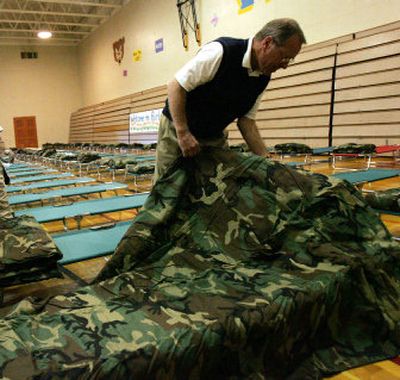National Guard ‘trying to be friendly’

NEW ORLEANS – He was shirtless, loud and had a loaded revolver under his belt.
Sgt. Cindy Lafore, leading an Oregon Army National Guard patrol through a half-flooded neighborhood here Monday, approached gingerly.
“This is my command post,” Ralph Amat shouted from his front porch. Amat, 69, a retired U.S. Marine, made it clear he had no plans to evacuate.
Lafore offered food and water. Amat shook his head and offered Lafore and her squad ammunition for their shotguns.
“I ain’t looking for no help,” he said.
It was an odd but routine encounter as Oregon National Guard troops fanned into the unpredictable streets of a city that remains a mix of ugly desolation and stubborn determination.
“I can’t leave my animals,” wailed Iris Perkins, 68. She had two dogs, four cats and a turtle inside. “What God has in store for me, so be it,” she said. “But I’m staying with my animals.”
Lafore, 41, of the National Guard’s 1186th Military Police Company based in Milton-Freewater, Ore., led the first of many forays into New Orleans as thousands of soldiers and police move to restore order and continue evacuating residents.
The Oregon National Guard has about 140 soldiers and airmen in the city, a number expected to swell to about 1,700 over the next few days. Two 500-member infantry battalions and a 500-member combat support battalion have been mobilized.
Brig. Gen. Doug Pritt, one of the top officers at the Guard, arrived at 2 a.m. to take command of the operation.
On Saturday, Oregon troops commandeered a vacant church, convent and convalescent home as their headquarters. The Holy Angels Apartments, slightly more than a mile east of the historic French Quarter, was relatively unscathed by the flooding.
As the other battalions arrive, they will be housed in vacant fields or on industrial lands, Guard officers said.
Oregon troops have been given the job of securing a once densely populated swath of the city, including some of New Orleans’ poorest neighborhoods.
Pritt, who flew over the area, said he rarely has seen such devastation, and the job also is more challenging from a security perspective. New Orleans police shot and killed two men who allegedly had committed an armed robbery, Pritt said; five others were reported killed by police in a gunfight Sunday.
But Lafore and her squad took a low-key approach. They carried rifles, shotguns and sidearms, but only the pistols were loaded.
She ordered the three soldiers in her squad to walk in patrol formation but loosely. “We’re not doing that Army stuff,” she told them. “We’re trying to be friendly.”
Yet, as they approached a group of men sitting on a porch and drinking, she looked behind her to Sgt. Scott Shivley and asked, “You got my back?”
Some streets still were knee-deep in water, while others were clear. In some blocks, trash and debris littered the sidewalks, and entire walls of some homes had been blown away. The vacant houses, patrolling soldiers and growl of helicopters overhead gave New Orleans the appearance of being under siege.
Yet, in nearly every block, people sat on porches or looked through windows. Some had had enough and asked to be escorted to a bus that could take them to an evacuation center and out of the city.
But most were bent on staying and were hunkered down with food and drink. Some, many of them desperately poor, said life isn’t much different from what it had been before the storm.
“We got music, we got cold beer, we got everything,” said Michael Campbell, standing with about five others on a corner, eating, drinking and laughing.